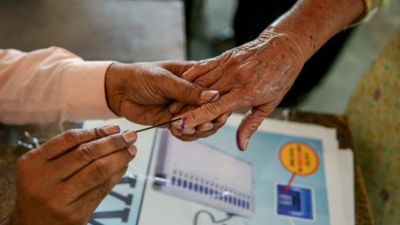- News
- City News
- amritsar News
- Political promises and trade hope for Amritsar
Trending
Political promises and trade hope for Amritsar
Candidates in parliamentary elections advocate for reopening trade with Pakistan via Attari land border in Amritsar. The issue is complex, with local traders expecting promises to be fulfilled post-election. Trade halt post Pulwama attack led to increased customs duty and revoked MFN status from Pakistan.

Representative image
AMRITSAR: In the recently concluded parliamentary elections, candidates from all major political parties highlighted the potential benefits of reopening trade with Pakistan through the Attari land border in Amritsar. These sentiments are echoed by Pakistani traders as well.
This issue, however, is more complex than simply unlocking a gate to resume the trade.The local importers and exporters now expect these politicians to fulfill their promises once the new government is formed in Center.
A prominent import export trader B K Bajaj is of the view that Indo Pak trade primarily benefits Pakistan more than India. Nevertheless, the prospect of trade resumption is seen as highly advantageous for Amritsar as it could create 25,000 to 30,000 jobs, directly and indirectly.
However, he said "Opening the trade route with Pakistan via the Attari land border shouldn't be viewed as an India-Pakistan trade initiative but more specifically as an Amritsar-Pakistan trade venture”.
Notably, the trade between India and Pakistan came to a halt post Pulwama terror attack in February 14, 2019 following which India not only increased the customs duty to 200% on all imports from Pakistan,making the business unprofitable, but also revoked the Most Favoured Nation (MFN) status given to Pakistan which gave certain business privileges to the neighboring country .
President of the Lahore Chamber of Commerce and Industry (LCCI), Nauman Kabir said that during the recently concluded general elections, the candidates had been discussing and making announcements for the resumption of trade with Pakistan and expressed hope that after formation of new government in India, they would work to fulfill their announcement. He reiterated that the LCCI would write the Federation of Indian Chambers of Commerce and Industry urging them to begin efforts to resume trade with Pakistan.
When asked about Pakistan’s interest in opening the trade with India, Bajaj said that the Sharif brothers in Pakistan, particularly Prime Minister Shehbaz Sharif and his influential sibling Nawaz Sharif, are keen on reopening trade with India.
“The inclination to open the trade is driven more by Pakistan's internal economic challenges than by a shift in foreign policy .For India, the decision to impose a 200 percent duty on Pakistani goods came in the wake of the Pulwama attack in 2019,which halted the bilateral trade. The Indian government did not close the trade route per se but made it economically unviable for Pakistani exporters” said he.
Bajaj informed that efforts were being made to convert the Integrated Check Post (ICP) at Attari into an Inland Container Depot (ICD), which would serve as a dry port or multimodal logistics center .
According to reports, the ICD would offer services from sea custodians, the customs department, carriers, freight forwarders, and customs brokers, all at one spot, to facilitate exporters and importers in the smooth handling of cargo.
"The ICD could also be helpful to Pakistani exporters, especially those in Lahore and nearby areas, who currently have to transport their goods to Karachi. Being close to Attari could provide them with a convenient alternative," he said.
A senior official of the Customs department who didn’t wish to give his name said that the resumption of trade hinges on addressing a range of political, economic, and security concerns even as there are certain geopolitical complexities involved.
This issue, however, is more complex than simply unlocking a gate to resume the trade.The local importers and exporters now expect these politicians to fulfill their promises once the new government is formed in Center.
A prominent import export trader B K Bajaj is of the view that Indo Pak trade primarily benefits Pakistan more than India. Nevertheless, the prospect of trade resumption is seen as highly advantageous for Amritsar as it could create 25,000 to 30,000 jobs, directly and indirectly.
However, he said "Opening the trade route with Pakistan via the Attari land border shouldn't be viewed as an India-Pakistan trade initiative but more specifically as an Amritsar-Pakistan trade venture”.
The trade could provide immediate economic relief to Pakistan, it would significantly boost Amritsar's economy by creating a substantial number of jobs and stimulating local industries. But , the trade will not have a major impact on the broader Indian economy, as the country has the capability to generate similar economic benefits by giving a small push to local industries nationwide, he said.
Notably, the trade between India and Pakistan came to a halt post Pulwama terror attack in February 14, 2019 following which India not only increased the customs duty to 200% on all imports from Pakistan,making the business unprofitable, but also revoked the Most Favoured Nation (MFN) status given to Pakistan which gave certain business privileges to the neighboring country .
President of the Lahore Chamber of Commerce and Industry (LCCI), Nauman Kabir said that during the recently concluded general elections, the candidates had been discussing and making announcements for the resumption of trade with Pakistan and expressed hope that after formation of new government in India, they would work to fulfill their announcement. He reiterated that the LCCI would write the Federation of Indian Chambers of Commerce and Industry urging them to begin efforts to resume trade with Pakistan.
When asked about Pakistan’s interest in opening the trade with India, Bajaj said that the Sharif brothers in Pakistan, particularly Prime Minister Shehbaz Sharif and his influential sibling Nawaz Sharif, are keen on reopening trade with India.
“The inclination to open the trade is driven more by Pakistan's internal economic challenges than by a shift in foreign policy .For India, the decision to impose a 200 percent duty on Pakistani goods came in the wake of the Pulwama attack in 2019,which halted the bilateral trade. The Indian government did not close the trade route per se but made it economically unviable for Pakistani exporters” said he.
Bajaj informed that efforts were being made to convert the Integrated Check Post (ICP) at Attari into an Inland Container Depot (ICD), which would serve as a dry port or multimodal logistics center .
According to reports, the ICD would offer services from sea custodians, the customs department, carriers, freight forwarders, and customs brokers, all at one spot, to facilitate exporters and importers in the smooth handling of cargo.
"The ICD could also be helpful to Pakistani exporters, especially those in Lahore and nearby areas, who currently have to transport their goods to Karachi. Being close to Attari could provide them with a convenient alternative," he said.
A senior official of the Customs department who didn’t wish to give his name said that the resumption of trade hinges on addressing a range of political, economic, and security concerns even as there are certain geopolitical complexities involved.
End of Article
FOLLOW US ON SOCIAL MEDIA










